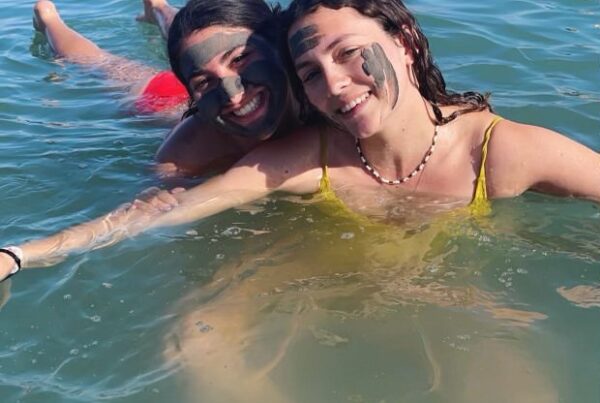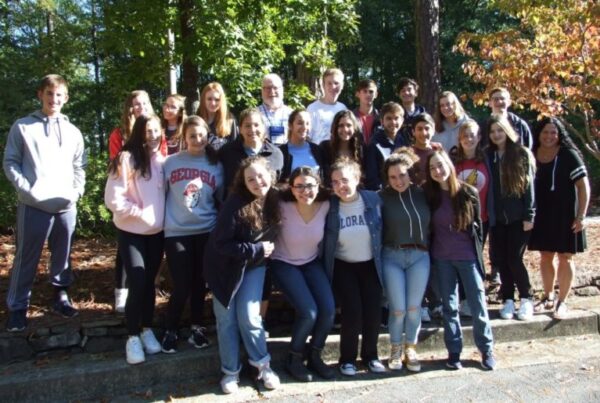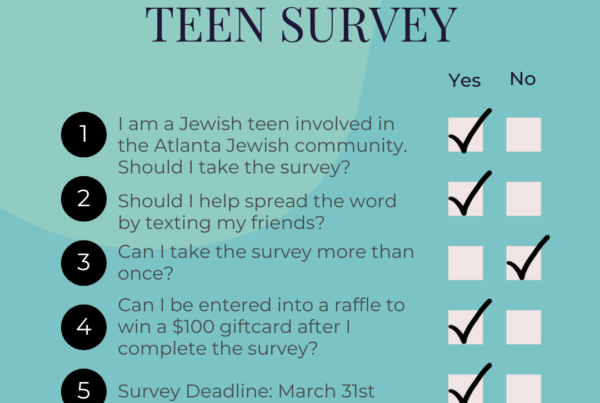By Bob Bahr
First published in the Atlanta Jewish Times ›
Last year Nanci Rosing’s son, Alex, was finishing up his bar mitzvah study and preparing for a celebratory trip to Alaska when his mother noticed a significant change in his personality. Although Alex was a good student and well-liked by his teachers and classmates at The Davis Academy, when he came home from school each day he was a different person.
He spent most of his time alone, in front of an iPad or computer screen, rarely speaking or interacting with his parents or an older brother, uninterested in sports or other after school activities.
For Nanci Rosing and her husband, Mark, the change in behavior was a red flag.
“His teacher and counselors were seeing a different kid than we saw at home,” she says, “but he wouldn’t admit to being anxious or upset. He would just say he was OK, but he wasn’t. We didn’t know how to help him.”
What she didn’t immediately realize was that her son was one of the millions of American children and adolescents who suffer from chronic anxiety disorders. While a certain amount of anxiety is normal in children and adults and is an important component of our survival instinct, anxiety disorders are the nation’s most common mental illness, according to the Anxiety and Depression Association of America. It estimates that one in eight American children suffers from serious anxiety.
It may take the form of sudden panic attacks or separation anxiety, an obsessive-compulsive and post-traumatic stress disorder, or in the case of Alex Rosing, severe anxiety associated with fear of social situations during which he was expected to interact with others in an unfamiliar situation.
An estimated 80 percent of young people with a diagnosable anxiety disorder were not getting treatment, according to a 2016 study of mental health in children by the Child Mind Institute. The reasons varied, but in many cases, parents just don’t recognize their child is in trouble.
Jenny Howe, a psychotherapist who helps teens overcome anxiety, narrates the film, Angst. She will lead a discussion at the MJCCA Aug. 19 with parents and professionals.Jenny Howe is a psychotherapist with nearly 20 years of experience working with troubled youth. She said early treatment can sometimes head off much more serious problems later.
“Often anxiety is an indication that there are other mental health issues happening that may not have been diagnosed yet. So if treated early, it can often be preventable for a lot of other mental health issues.”
Later this month a new program at the Marcus JCC sponsored by JumpSpark, a teen initiative, and a number of community organizations, aims to raise awareness about the danger of chronic anxiety in teenagers here, and how parents can get more involved in dealing with the problem.
The schedule features a pair of film screenings and discussions of a recent documentary, “Angst,” which examines the causes and effects of anxiety in teens and young adults and how parents can work with their children to get help.
The discussion will launch a yearlong series of programs for Jewish teens and their parents presented by JumpSpark, which is beginning the second year of a five-year program in Atlanta.
It is supported by a $2.1 million grant from the Jim Joseph Foundation to develop a Jewish Teen Education and Engagement Initiative. The grant is to enable Atlanta teens to explore, through a Jewish lens, their experiences in the community.
The executive director of JumpSpark is Kelly Cohen, who formerly worked at The Davis Academy. She believes that this year’s kickoff program is particularly important.
“We felt that dealing with teen anxiety was an important conversation to have right at the beginning of school year so that everyone has an awareness of the resources and tools to help teens navigate the anxieties of what it means to be a teen today.”
The “Angst” documentary highlights, in part, the experiences of Michael Phelps. During his legendary career as an Olympic swimmer he won a record-breaking 28 medals, more than any other single athlete in the history of the games.
What many people don’t know was how Phelps struggled several times along his Olympic career with serious issues of chronic anxiety and depression.
He was quoted recently as saying, “I remember sitting in my room for four or five days not wanting to be alive, not talking with anyone. That was the struggle for me … I reached that point where I finally realized I couldn’t do it alone.”
Athletes may be more prone to mental pressures than the general population, according to a 2012 study of German athletes by the Technical University in Munich. The same may also be true for teens in the Jewish community.
“There’s an expectation of success that goes along with the ethnicity,” said Howe, who narrates the documentary and will help lead a discussion after the screening.
“Kids — and I’ve worked with a lot of Jewish kids – believe that in order to be loved, whether this is rational or not, they need to be successful, they need to perform.”
But those considerations are in addition to other influences, such as the internet and social media, which make growing up so stressful in modern society.
“Anxiety,” she notes, “has been on the rise over the last 10 years. Because of the influence of social media, teens have the ability to compare themselves constantly to others that in previous years, they didn’t know before. So, with all these comparisons there is the possibility that, instantly, they feel inferior.”
Nanci and Mark Rosing’s concerns about the seriousness of their son’s anxiety disorder led them last summer to an 11-week program in Utah specially designed for young people with treatable anxiety.
During the past school year, Alex has been a student at WayPoint Academy in Huntsville, Utah, a residential program that works with young people under professional supervision to tackle the challenges of anxiety.
It was a major commitment, in many ways, but Nanci feels it paid off.
“He engages, he looks in someone’s eyes and talks to them. You can see a sense of confidence. He can now do a lot of things that would even make me uncomfortable. He’s learned a skill that hopefully he can bring home.”
He’s coming home this month to resume his studies at The Weber School, to face what his parents feel will be a much brighter future and finish up work on that bar mitzvah he never had.
“Angst – Raising Awareness Around Anxiety” will be presented by JumpSpark at the Marcus JCC theater, Sunday Aug. 19 from 3:00 to 5:00 p.m. for parents and professionals and on Wednesday, Aug. 22 from 6:30 to 8:30 p.m. for teens. For tickets and more information, https://jumpsparkatl.org.





